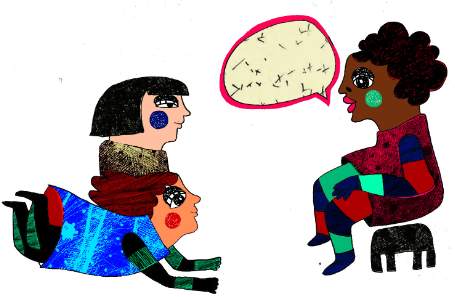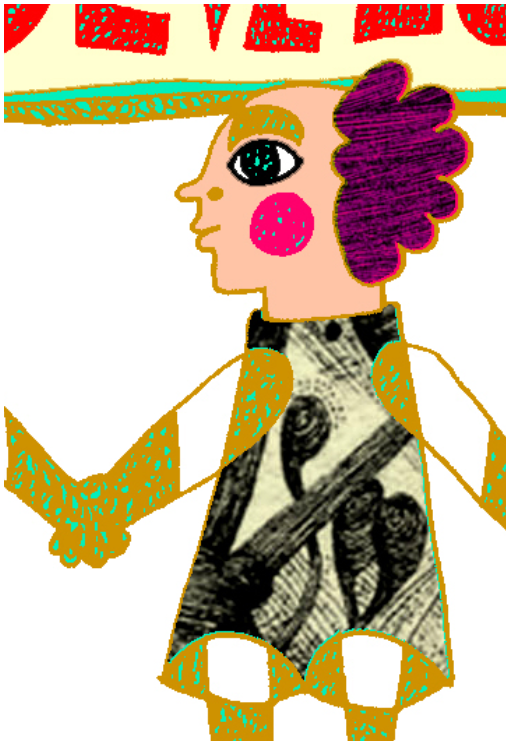8-Exercises for Getting Into Character and
Developing the Play
In this unit the group will follow-up on the aspects tackled in the last session, continue with improvisation, getting into character exercises and building up the play. The aim of the session should be to have the Forum Theatre play in a finalized form. In this session it might happen that some of the roles will change based on the feelings, acting and improvisation of the actors.
There are 2 possibilities in this sense
-
The actors themselves communicate to the group that they don’t want to purse that specific role (in which case it is necessary to ask the group to volunteer to take the new opening);
-
The team considers that one actor (and this can happen mostly in relation to the main roles: oppressed and oppressor) based on his/her improvisation is not contributing to a strong enough oppression in the play– we can met oppressed characters that are in fact quite powerful, if not very powerful or oppressors that are not strong enough and the imbalance level is not as high as needed. This is a more delicate situation which is in fact very dependent on the time left for finalization of the play. In time and with proper training (with more specific activities and exercises in this sense) to support the team members everybody can play any role as realistically as possible. If time is not in favour of the team this means a change needs to be made in the division of roles. Very often the team continue with rather weak performances because they don’t want to hurt the feelings of the team members – but it can actually lead to a low impact on the public-the Forum Theatre group needs to understand that they do their work not for themselves but for the public among whom we want to start a change-if somebody is too strong to be an oppressed character (because he/she is still too attached to their own personality) they should not take it personally and understand that such a role will not benefit the public. This mind-set needs to be encouraged and reminded often by the facilitator.
Structure of the unit
-
Introduction of the day (explaining the context and what will happen in this session)- 5 minutes
-
Music and action-10 minutes
-
Finalizing the first round of improvisation of the play-45 minutes
-
Getting into character (angels and demons, hot seat)- 45 minutes
-
Final rehearsals of the day-1 hour
-
Final circle (evaluation, announcements) -15 minutes

2-Music and action-10 minutes
Aims- to warm-up and energize the group, to prepare them for the day, to create an atmosphere of wellbeing and general positivity;
Description-The group is instructed that there will be music and they are invited to dance and feel free to do whatever they want. The music should be more active and dynamic. When the music stops they have to freeze and listen to the instructions from the facilitator (which usually involves some sort of task to be delivered by the participants). After each task the music will play again until the next one. There will be a couple of rounds like that.
Suggestions for the tasks: go to at least 3 people and tell them something nice about themselves; gather in groups according to the colour of your socks, look at somebody and recognize a long lost friend, shout very loudly – “Today is a fantastic day”, go to everybody in the group and say : “Thank you”; go to one person and tell her/him something that you have never told somebody in the group so far; hug individually at least 4 people; go to everybody and tell them how much you are looking forward to today.
3-Finalizing the first round of improvisation of the play-45 minutes
Aim – to have one round from beginning to end of the initial improvisation of the play; to warm up and make the participants ready for more acting
Description- The group is reminded of what progress was made in the last session, and at what stage they are now and that they will follow up on what happened the last time and continue in order to have the first improvisation draft of the play.
The process will go as described in the last session and hopefully one draft version of the play has been performed. It can happen that the last scene in this first round of impressions is not as strong as needed but it will be worked out with rehearsal and some specific exercises in this sense.
These first rounds of improvisation are in fact designed to gather content (in terms of what information needs to be included or not in some specific scene) and less to have high competencies of acting from the volunteers as that will improve through practice, rehearsals and specific exercises which will be tailored to their needs.
At this stage it might happen that some of the actors want to change their roles – you can advise them to wait until they do some more supporting exercises – if they don’t want to wait you have make some decisions at this moment (before you move on).
4-Getting into Characters (angels and demons, hot seat) - 45 minutes
Aims- to support the actors to get into their roles better, to develop their characters more deeply, to increase their competence in Forum Theatre
Description
Angels and Demons- aims to provide the actors with more ideas and thoughts for their roles. (Makes use of the group’s potential to provide ideas to the actors)
The participants stand in 2 lines facing each other– the angels are in one line – in the other one are the demons. One by one the actors walk in between these lines. They walk in character and just listen. The people will talk in their ears telling them why they should do a specific action or not, or that they should do something or not…it very much depends on their role and the story, and their ideas, suggestions are connected to the story; The Angel will try to give good advice, positive while the Demons do the opposite (they can also use each other’s arguments to provide more arguments on any of the sides). For example: Angel: " Go and talk with your husband, tell him you want to take a job, etc.”... The Demon will say: " Don’t you dare confront your husband, don’t you know what he is capable of? Do you really want to take that risk? You’d better focus on your children”. The actors do not reply, they just listen to it until they finish walking in the line. One by one the actors (if they wish so, and if they feel that it will help them) will walk in between the lines. It would be useful to ask the group at the end of the exercise how much they consider the exercise helped them to get in their roles.
Hot seat – aims to help the actors understand their characters more deeply and to develop them more strongly as well as to prepare the actors for the rehearsal of their Forum Theatre play;
Each participant, in character, will have to sit on an empty chair in the middle of the room. All the other team members face the chair, as an audience and ask the person (the character) from the chair questions, as many and as deep as possible. The person from the chair must answer to all of them honestly. All these answers can come like from his inner self – the character is not going to lie to him/herself. This exercise is recommended primarily for the oppressed and the oppressor, and any other character that feels the need to get deeper in the role. After each round of questions the group can give feedback related to how they assess the realism expressed by each role and also how much power is expressed by oppressor and oppressed.
This exercise usually helps the group see if the initial oppressor/oppressed is not strong enough /too strong. If they are the facilitator can ask if anybody would like to go on the hot seat just to show another option. When the group has 2 versions of the 2 characters they can discuss what to do next depending on the time left for rehearsals.
If the need for redistributing the roles emerges it is important to remind the group that they are creating this play with an aim in their mind which is related to our target group. If the roles are partially redistributed it would be helpful to do a “hot seat” before the start of the next rehearsals.
5-Final rehearsals of the day-1 hour
The group is briefed on what they achieved in the last rehearsals and how they proceed now. The process of rehearsals (with feedback and comments from everybody from the team) continues as it was implemented in the last session.






